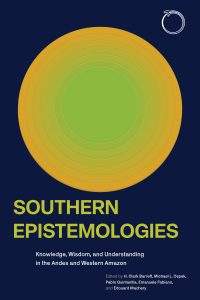Knowledge, Wisdom, and Understanding in the Andes and Western Amazon
Edited by H. Clark Barrett, Michael L. Cepek, Pablo Quintanilla, Emanuele Fabiano, and Edouard Machery
What does it mean to know, and how is knowledge practiced? How can Indigenous perspectives challenge conventional concepts of knowledge in the Global North? Drawing on Indigenous epistemologies from the Andes and Western Amazon, Southern Epistemologies investigates how knowledge, wisdom, and understanding are shaped by local cultures, languages, bodies, and environments.
Bringing together linguists, philosophers, anthropologists, and Indigenous knowledge holders, the volume examines the dynamic interactions between culture, language, and place, showing how the unique linguistic histories and worldviews of Andean and Amazonian societies inform distinct ways of knowing. By interpreting these perspectives on their own terms, the book offers fresh insights into the plurality and diversity of human knowledge.
As the first volume specifically focused on Indigenous South American epistemologies, Southern Epistemologies foregrounds Indigenous knowledge systems and science while fostering dialogue with academic traditions. By opening new interdisciplinary and cross-cultural conversations, this groundbreaking volume challenges conventional notions of knowledge and illuminates how engagement with Indigenous perspectives can expand and enrich our understanding of what it truly means to know.
H. Clark Barrett is Professor of Anthropology at UCLA. He studies contemporary variation in social and moral judgment as a window into the evolution of human cognition. His current project asks how evolution, cognition, and ethics can be better understood by expanding their study outside traditional European frameworks.
Michael L. Cepek has been working with Ecuador’s Indigenous Cofán Nation for more than three decades. He is Professor of Anthropology at the University of Texas at San Antonio and president of the Cofán Survival Fund, a US-based nonprofit that supports the Cofán’s land rights, healthcare, and educational projects.
Pablo Quintanilla is full Professor of Philosophy at Pontificia Universidad Católica del Perú and Senior Research Associate in the Department of the African Centre for Epistemology & Philosophy of Science (ACEPS), University of Johannesburg, South Africa. He holds a PhD in philosophy from the University of Virginia.
Emanuele Fabiano is a postdoctoral researcher at the Center for Social Studies at the University of Coimbra (Portugal) and a researcher at CISEPA, Pontifical Catholic University of Peru. He works in the Peruvian Amazon with the Urarina people. He researches the anthropological, social, and political effects of extractive processes, indigenous ecological knowledge systems, and the relationship between humans and plants.
Edouard Machery is Distinguished Professor of History and Philosophy of Science in the Department of History and Philosophy of Science and Director of the Center for Philosophy of Science at the University of Pittsburgh. He is the author of Doing without Concepts and Philosophy within Its Proper Bounds.
© HAU Books 2026
ISBN: 9781914363504
ISBN: 9781914363528 (PDF)
306 pages | 6 x 9
$35
PDF (June 2026)
H. Clark Barrett
Michael L. Cepek and Cesario Lucitante
Jean Langdon
Amy Leia McLachlan
Sandhya Krittika Narayanan
David W. Fleck
Pablo Quintanilla
María Inés Silenzi
Jan David Hauck
H. Clark Barrett
Medardo Arahuate Manizari, Jorge Caringkia, Jervacio Gualinga Chuji, Mariano Tsetsekip Santi, Joshua Homan, Alejandro Erut, and Emanuele Fabiano
Laura Rival
